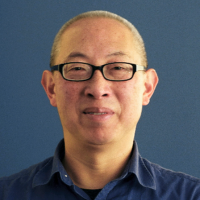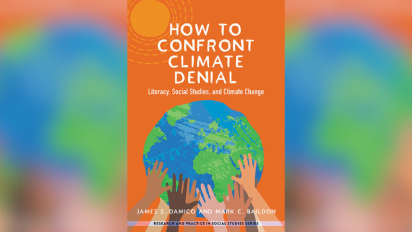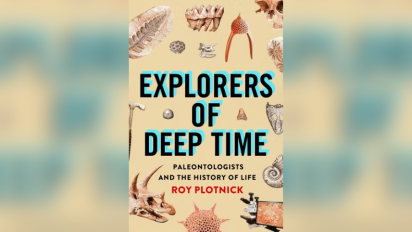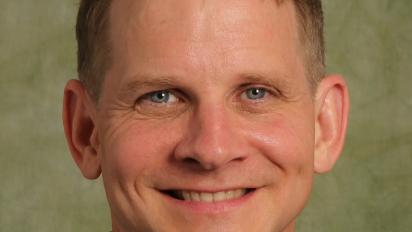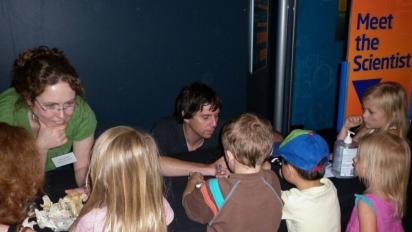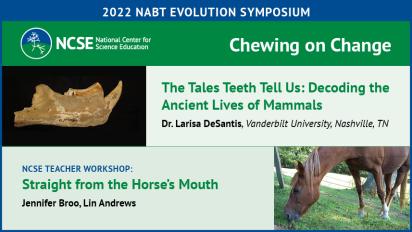Larisa DeSantis: Changing the face of science one outreach experience at a time
DeSantis, a vertebrate paleontologist whose research lab's mission is to discover "ecological and evolutionary responses to global change," was the featured speaker at an evolution symposium co-sponsored by NCSE.
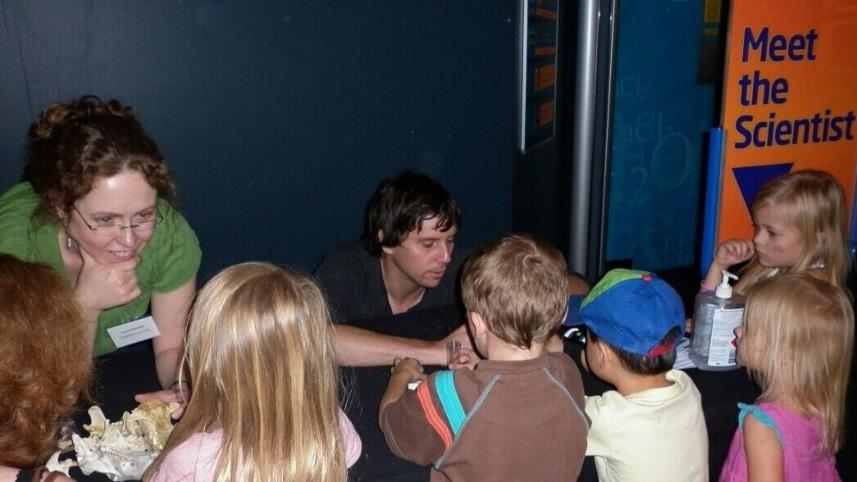
Paleontologist Larisa DeSantis, left, engaging in science outreach. Photo courtesy of the DeSantis DREAM Lab.
Growing up, Larisa DeSantis didn’t think she was going to be a paleontologist. Though she lived near the La Brea Tar Pits in the heart of Los Angeles, and visited there often, DeSantis did not see female fossil hunters represented among scientists in popular culture. There were no role models in her field of vision — women who were vertebrate paleontologists at prestigious universities with National Science Foundation grants, their own research labs, and TEDx talks to their credit.
As a child, DeSantis asked her mother why she became a teacher. Her mother, she recalls, responded by saying, “Well, I faint at the sight of blood so I couldn’t be a nurse. I can’t type so I couldn’t be a secretary. So this is why I became a teacher.” At the time, DeSantis didn’t grasp the implications of her mother’s words. Later, though, she realized that she could not let those kinds of pernicious limitations persist, particularly in the field she is so passionate about.
As a result, DeSantis has devoted a great deal of her professional life as a paleontologist to engaging in public outreach. Of course DeSantis believes that everyone should understand evolution and its profound relevance to everyday life — an important reason to educate the public. Moreover, she wants to help others feel the joy she experiences when wrestling with the questions engendered by fossils and the lives of ancient animals. “Why as scientists do we do what we do,” she asks, “if not to share it and let other people learn from what we’re learning?” But what is ultimately driving her to engage in public outreach, she says, is to help diversify a stubbornly undiverse profession. She wants to ensure that girls today see science as a career path. She wants to help change the face of science.
Paleontologists who aren’t involved in outreach — it’s a missed opportunity.
DeSantis’s outreach is diverse and long-standing. Recently, she presented at the Tennessee Women in Science, Technology, Engineering & Research (TWISTER) conference for high school girls. She has discussed saber-toothed cats with Odis (“a puppet with a thirst for knowledge and adventure”) at Paleofest 2020. She has participated in a National Fossil Day event called “Ask a Vanderbilt Paleontologist.” And going further back, her first — and, she says, one of her most fun — jobs was “driving a 38-foot-long Winnebago that was a moveable museum with dinosaur exhibits in New York City. I kind of look like Ms. Frizzle anyway,” she says, laughing. “This was not long after 9/11, so many of the schools had limited field trips. We would go to the different boroughs, bring our exhibits, and work with the teachers and do lessons with the students.”
With such a commitment to science outreach, DeSantis was happy to help when asked by NCSE to give a presentation at the November 2022 National Association of Biology Teachers conference, which she reprised virtually as part of a Darwin Day 2023 celebration. (See “Chewing on Change: The Tales Teeth Tell Us.”). The two-part talk included a portion led by Teacher Ambassador Jennifer Broo devoted to the exploration of an NCSE lesson set, Good is Good Enough. DeSantis, for her part, opened by focusing on an important aspect of her research interest: studying the fossilized teeth of ancient mammals to determine past climatological conditions.
At the DeSantis DREAM (Dietary Reconstructions and Ecological Assessments of Mammals) Lab at Vanderbilt University, her team uses their study of teeth to ascertain diet. “People often ask why do you care about diet?” DeSantis says. “It’s because diet is such a huge part of how an animal interacts with their environment. Diet essentially influences where an animal lives. Think of a koala eating eucalyptus. Well, it needs a eucalyptus tree to live in to be able to eat that resource. Diet can also affect how an animal moves across its landscape. Think about wildebeest migrating in response to where the lush grasses are. And then it can also affect an animal’s morphology and ability to take down prey. Think of a cheetah able to hunt its various prey items. And it can also affect things like reproduction.”
Studying fossilized teeth can also help determine how arid an animal’s environment was and potentially provide some indication of relative temperature. DeSantis and her team use other information as well, such as ice core data, to provide a more complete picture. DeSantis can then determine how animals responded to ancient climate change, potential reasons why they went extinct, and the long-term consequences of both climate change and large animal extinctions on a diversity of plants and animals.
These findings can then be used to better understand the impact of climate change today. They begin to answer some of the fundamental questions that drove DeSantis to first study environmental management alongside paleontology: How did ancient mammals respond to climate change? What are the cautionary lessons we can take away? Why did some animals survive and not others? And what are things we can learn about those survivors?
Her NCSE-affiliated presentation did not represent DeSantis’s first collaboration with the organization. Just over a decade ago, she spearheaded an effort — with support from NCSE — to block a Tennessee bill that threatened to undermine the teaching of evolution and climate change. Dubbed the “monkey bill,” it called for teachers to present the “scientific strengths and scientific weaknesses” of topics that arouse “debate and disputation,” such as biological evolution and global warming. As DeSantis said at the time, the legislation brings “the political controversy into the classroom, where there is no scientific controversy.”
Though the bill ultimately became law — and remains on the books today — DeSantis is proud that she and her husband, a high school science teacher, were able to garner more than 5,000 signatures on a petition opposing the bill. Having spent a good portion of her adult life in the southeast — in Gainesville at the University of Florida, where she earned her doctorate, and now in Nashville, Tennessee, at Vanderbilt University — DeSantis knows firsthand the societal challenges that can exist when it comes to evolution and evolution education.
All the more reason to engage in outreach and public education, she says.
“Paleontologists who aren’t involved in outreach — it’s a missed opportunity,” DeSantis says. “I’ve had so many friends, or the parents of friends of my children, text me videos on their first day of kindergarten. The kids all want to be paleontologists! They’re fascinated by dinosaurs and ancient organisms!”
It’s a perfect opportunity to help them understand and embrace questions about our planet’s history and evolution. And who knows? Perhaps among them is the next Larisa DeSantis.

